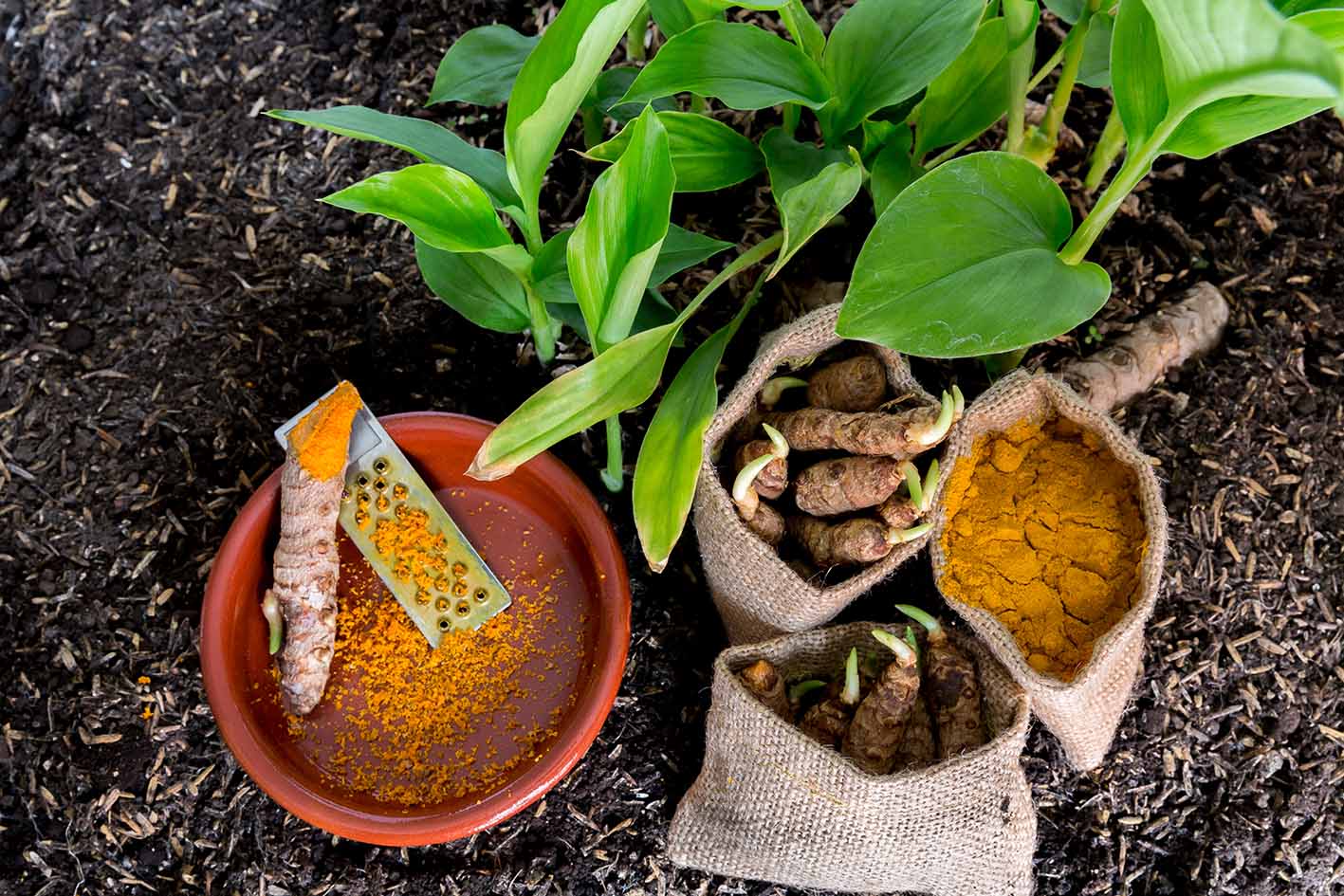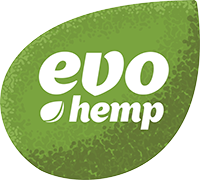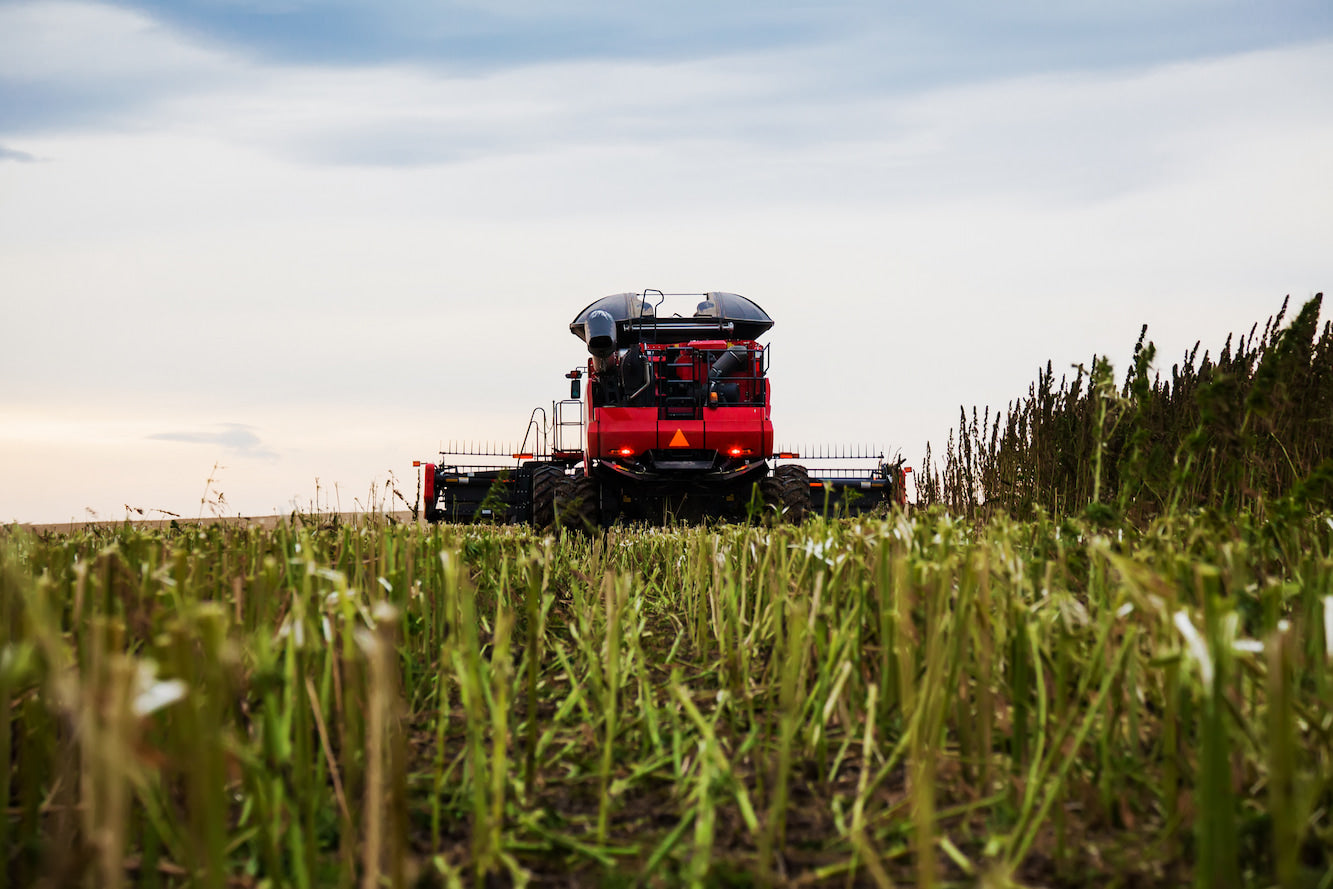CBD & Turmeric: A Winning Combination

There is a good chance you have turmeric sitting somewhere in your spice rack right now, or maybe you’ve enjoyed this warm golden spice mixed into a meal at your local Indian restaurant, or even sprinkled atop your latte at the trendy coffee shop in town.
Turmeric is becoming increasingly popular in modern dishes, and for good reason! This spice not only adds a vibrant color and subtle earthy flavor to your meal or drink, but brings a whole bunch of health benefits along with it.
Even better? Turmeric and CBD are thought to have a number of complementary elements that work synergistically when combined.
So if you’ve been looking for a natural supplement to support your wellbeing, or are hoping to help your CBD go even further in maintaining your physical and mental health, turmeric and CBD may be just what you need.
So what exactly makes turmeric and CBD the type of match that can give peanut butter and jelly a run for their money? Let’s get into it!
What Is Turmeric?
The turmeric spice comes from the root of the Curcuma longa plant. A member of the ginger family, this warming spice is most commonly found in India, and has played a role in herbal remedies for thousands of years.
A single teaspoon contains 0.3 grams of protein and 0.7 grams of fiber, which is a truly mighty amount of nutrients jam-packed into such a small quantity!
And beyond this impressive nutritional profile, turmeric also contains over 100 compounds. The most notable one: curcumin.
What Is Curcumin?
Curcumin is the main active ingredient found in turmeric. Curcumin is responsible for giving turmeric its rich golden hue, and it is also the reason behind turmeric’s many health benefits.
With over 3,000 publications on turmeric in existence, curcumin is one of the most well-studied herbal remedy properties to date.
What Is CBD?
Just as curcumin is one of the main compounds of the Curcuma longa plant, cannabidiol–more commonly known as CBD–is one of the main nourishing compounds found in the Cannabis sativa or hemp plant.
Unlike the cannabinoid THC, CBD calms the body without producing any psychoactive effects.
Why Combine Turmeric and CBD?
Although curcumin and CBD work within the body in different ways, the two plant compounds have a number of similar properties. Together, they are thought to provide even greater health benefits than either one can do on its own.
Once inside the body, CBD partners with the endocannabinoid system (the ECS). This system produces natural endocannabinoids, and transports them throughout the body so they can bind with cannabinoid receptors (CB receptors) in various muscles, organs, and tissues. Once bound to CB receptors, endocannabinoids are able to help maintain balance in the body by helping to regulate mood, sleep, and more.
As a cannabinoid, CBD can work within the ECS to support the endocannabinoids already at work.
Meanwhile, curcumin is thought to work with the endocrine system. The endocrine system plays a similar role to the endocannabinoid by helping maintain homeostasis within the body. Instead of transporting cannabinoids, however, the endocrine system produces and communicates with hormones.
When turmeric and CBD are paired together, both of these vital networking systems get a boost that can further support the body’s natural functions.
So, what are the main ways turmeric and CBD can support your wellbeing? More on that below!
Naturally Soothing
You know that feeling in your neck the day after falling asleep in a funny position? Or the discomfort that may settle in your back after hunched over a computer for too long? How about the soreness that creeps up on you the day after a good workout routine?
Well, CBD and turmeric both have properties that can help sooth the types of soreness and discomfort that can bring down your day.
The body relies on endocannabinoids and hormones to help ease feelings of discomfort. Curcumin and CBD are both associated with soothing properties that can aid the body in responding to muscle tension, joint soreness, and more.
Stress Support
When we are feeling tense, nervous, or overwhelmed, our bodies rely on endocannabinoids, hormones, and neurotransmitters to respond to the stress at hand and return to a more relaxed state.
The brain creates the endocannabinoid anandamide when the body is overly stressed. When anandamide binds with CB1 receptors, it can help promote a sense of calm by triggering neurotransmitters responsible for pleasure. When introduced to the ECS, CBD can support the stress-relieving actions of anandamide.
Curcumin can also support the body's natural hormone production in response to stress. By working with the endocrine system to support the healthy production of serotonin and dopamine, curcumin is thought to support the body in regulating pleasure, stress, and mood.
Antioxidant-Boosting
Both turmeric and CBD have antioxidant properties. These mighty molecules can support the body in combating free radicals, preventing oxidative stress, reducing swelling, and maintaining overall wellbeing.
Free radicals are unstable atoms that are formed when the body comes into contact with pollutants such as car exhaust or smoke. Free radicals are known to destroy healthy skin cells, which can lead to wrinkles and lines. Free radicals can also cause oxidative stress, which is known to put stress on the heart.
The antioxidants found in a number of plant compounds including curcumin and CBD can help stabilize free radicals, ultimately supporting the health of skin cells, heart function, and more.
How To Choose a CBD Turmeric Mix
When it comes to finding the best turmeric and CBD products to support your wellbeing, there are a few factors you want to consider.
Bioavailability
Bioavailability refers to how much of a substance the body actually absorbs. If the body isn’t able to absorb enough of a substance, it can pass right through you without having any benefits.
While curcumin and CBD both have naturally low bioavailability, there are super easy ways to help the body absorb more of each of these soothing compounds so they can best support your wellbeing.
> Fats
Both curcumin and CBD are fat-soluble, meaning that fat is needed to break them down into a form the body can absorb.
With that in mind, you’ll want to look for CBD and curcumin products that also have a fat ingredient, such as hemp seed oil or omega-3 fatty acids.
> Curcumin and Black Pepper
There is one compound in particular known to majorly help the body absorb curcumin, and there is a good chance you unknowingly consume it almost every day: piperine, also known as the main compound in black pepper.
Studies suggest that piperine can improve the bioavailability of curcumin by an almost-unfathomable 2000 percent!
Dosage
While shaking a bunch of turmeric and black pepper into your mix may very well lead to a tasty dish, this is unfortunately not likely to consist of enough curcumin for you to experience its many benefits.
Instead, you’ll want to look for a product that uses turmeric extract, which has a higher concentration of curcumin than the turmeric spice in your spice rack does.
The recommended dosage for turmeric extract ranges from 500–2,000 mg per day. A typical daily dose of CBD can range anywhere from between 5mg to 1000 mg.
It’s best to start with a lower dose of curcumin and CBD and work your way up to find what amount you respond to best.
CBD Variety
When choosing a turmeric and CBD supplement, you may also want to consider if the CBD used is full-spectrum, broad-spectrum, or isolated. Here is a quick breakdown of each:
> Full-Spectrum CBD
Full-spectrum CBD is often considered the most beneficial form of CBD, as it contains all of the nourishing plant parts found in the hemp plant, including cannabinoids, terpenes, and flavonoids. These pieces all work together to strengthen the effect of CBD.
While THC is included in full-spectrum CBD, there is not enough of it to cause any psychoactive effects.
> Broad Spectrum CBD
Broad Spectrum CBD includes all of the hemp plant’s terpenes, flavonoids, and cannabinoids, except THC. This option can be great for anyone who wants to experience the synergistic effects of the plant parts working together but is sensitive to THC or simply doesn’t want it in their formula.
> CBD Isolate
CBD Isolate is a pure form of CBD, with no other plant parts included. This is a good option for anyone looking to get started with CBD, but is nervous to do so because of all the other compounds found in broad and full-spectrum.
Are CBD and Turmeric Products Safe?
Both CBD and turmeric are considered extremely safe.
While minor side effects have been reported, these often only occur if curcumin or CBD is taken in very high amounts. Too high a dose of curcumin has been associated with nausea and diarrhea, while a large concentration of CBD may lead to nausea, headaches, and drowsiness.
Always make sure to follow the instructions for any curcumin and CBD product and do not exceed the recommended dose.
You’ll also want to make sure your products are third-party tested, which guarantees they are made with high-quality ingredients, and that the dosage information accurately reflects the product.
Final Thoughts
For all the ways that CBD can support your mental and physical wellbeing, curcumin can complement those benefits and help your CBD go even further. This is a pairing you won’t be able to get enough of!
Whether you want to incorporate CBD and curcumin into your cooking or take a simple supplement before bed, evo hemp has a wide range of CBD varieties to help you get started.
Sources:
Curcumin: A Review of Its' Effects on Human Health | Foods
Cannabinoids as novel anti-inflammatory drugs | Future Med Chem
Cannabidiol as a Potential Treatment for Anxiety Disorders | Neurotherapeutics
Antioxidative and Anti-Inflammatory Properties of Cannabidiol | Antioxidants (Basel)
- Tags: CBD



